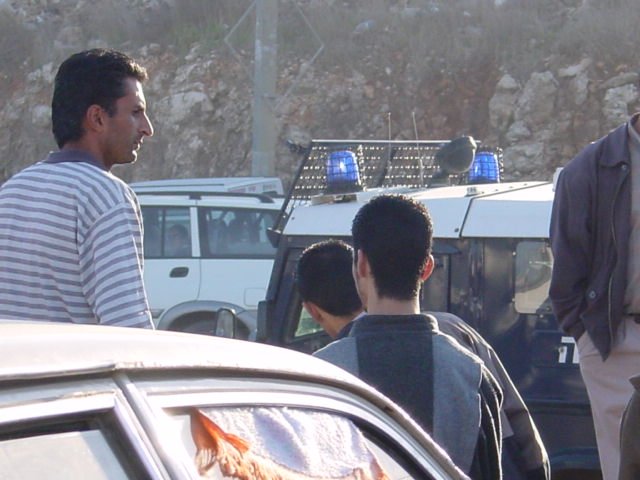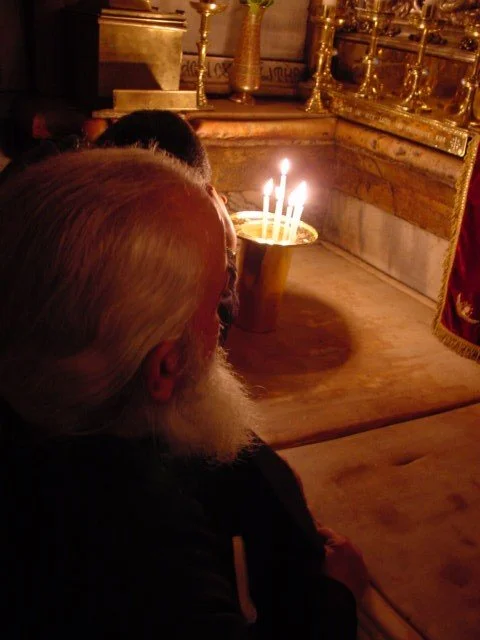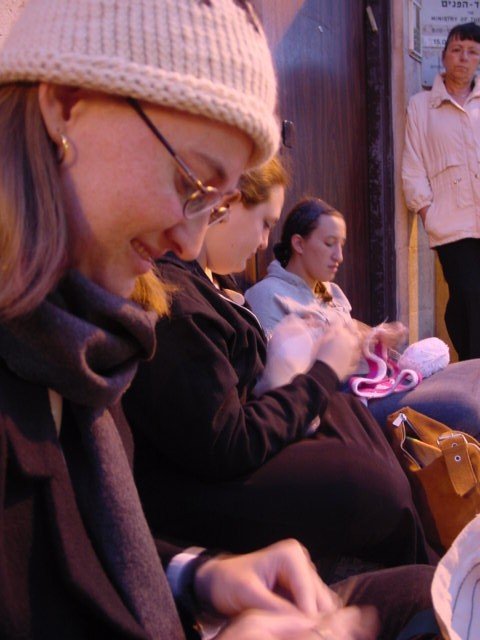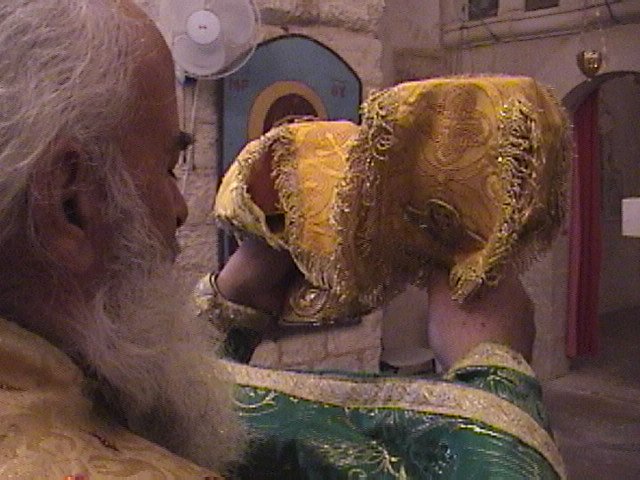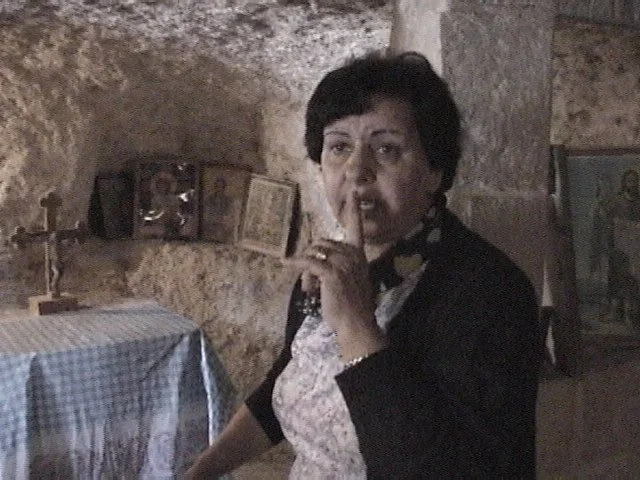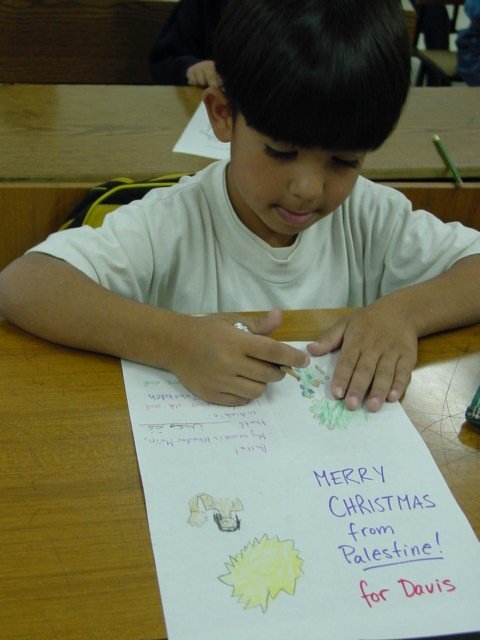November, 2002
Marthame spoke with the Melkite Deacon Firas in the evening, who had made a trip to Haifa and back to see his bishop today. The official news is that his ordination will be on December 14th in Zababdeh.
We give thanks that everyone was able to arrive to school today. Elizabeth's seventh graders are in the midst of oral presentations that they have prepared, each about a different country in Africa.
The old West Bank taxi stand outside Damascus Gate has relocated to this intersection. Cement blocks and army vehicles are everywhere, making the line of cars into and out of Ramallah interminable. Most of the commuters have given up and simply walk across through the dust and mud.
Once an Arab village that was overwhelmingly Christian, Ein Kerem is now almost thoroughly Jewish. The churches are maintained by their respective communities, and one Arab family remains from the once-thriving Roman Catholic community.
One bishop with a splendid title (Bishop of Constantina) was responsible for IDs and appointments for the Patriarch. Another with a similarly wonderful prefix leaned over a lectern bending under the weight of notebooks (in Greek) detailing the reimbursements of parish priests. Another chain-smoked as he worked over a computer (history and technology meet in bizarre ways here).
Another passenger talked about being a maternity nurse in Ramallah, and described a newborn baby which arrived dead at the hospital. His mother was not allowed through a checkpoint in time; he was born and died there.
The news is full of the British national killed in Jenin Camp. After initial denials, the Israeli army admitted to shooting him, thinking he was carrying a weapon (a UN flag, it turned out).
Different stories are abounding about what really happened, the Israeli army claiming he was caught in a cross-fire and shot accidentally. Given the recent coverage of the attack in Hebron, the idea that the truth, and not political spin, will out is getting harder to believe.
At breakfast in the hotel, we heard news of a bus bombing in West Jerusalem. As we walked back to the Ministry, it was a chilling feeling, wondering where the bombing was, if the girls we'd been chatting and knitting with had been there.
The Crusades are alive in the popular memory here, and also are deep-seated in the Western consciousness as something to be commended (selfless people are called "crusaders," our most precious social causes are our "crusades"). Somehow we can decry “jihad” without despising “crusade”.
So there the students sat, adorable first graders, side by side, Muslim and Christian, sharing their coloring pencils as they wrote “Thank You” and “Merry Christmas” notes to sponsors of the school.
He called his wife at that point, to tell her that something was amiss, at which point the Israeli soldiers forced him to turn off his cellphone. No one has heard from him since, and no one knows where he may be held.
In the evening, the school hosted a ftuur, the sundown breaking of the fast for Muslims during the month of Ramadan.
Marthame quoted the Scripture: "Be wise as serpents and innocent as doves." (Matthew 10:16) In other words, trust God's healing power, but don't be glib about it. Unfortunately, when Marthame translated the Bible verse into Arabic, it came out: "Be as clever as a big worm and as simple as a pigeon."
In the evening we went to visit our good friends, taking advantage of a lighter work load to make good on some social obligations.
"These were my sons, too." She went on to tell Elizabeth how her sons were killed last year in an Israeli attack on a building in Nablus. They were playing on the street next to the building.
To be included in such an intimate gathering is grace itself - and in our time here, our intentional inclusion in such meaningful moments has been one of the most powerful blessings we have received.
We ventured out for lunch at a friend's house overlooking Zababdeh with Fr. Aktham and Deacon Homam, featuring delicious msakhan and the ubiquitous olives.
She and another of the village's faithful shared stories and memories, all colored by sweetness and sadness. That contradiction defines life here.
In short, anyone who wanted to leave or enter could, just as long as they didn't travel the main road. Being frustrated by such arbitrariness is par for the course.
After school, as we hustled home under our umbrella, we passed a number of umbrella-less kids waiting under the school awning for the deluge to abate.
The car arrived to the outskirts of Nablus, where a soldier made the mother and four kids get out of the car and then riddled the car with bullets. Like many kids in this battered land, the ten-year-old brother is still suffering psychologically from the trauma.
Marthame and one of our friends from the University went with Deacon Firas to visit the Christians of Jalame.



